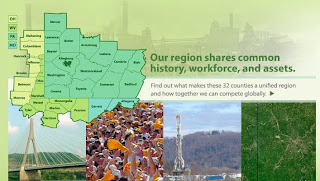 Fracking is an activity that occurs in many parts of the country. While this gas extraction occurs within the state of PA and promotes the intention of "energy independence" the resources and most profits obtained from this gas drilling will not remain in the state; or possibly not even within the United States. See here for an overview.
Fracking is an activity that occurs in many parts of the country. While this gas extraction occurs within the state of PA and promotes the intention of "energy independence" the resources and most profits obtained from this gas drilling will not remain in the state; or possibly not even within the United States. See here for an overview.While often coined to be "clean energy," fracking and gas drilling is NOT a clean energy process. The process actually creates imminent health issues, air pollution and both water quality and quantity issue. Within this New York Times link is a document whereby Weston Wilson, an Environmental Protection Agency (EPA) employee and whistle blower, reveals EPA's potential failure to protect America's groundwater. His belief is that EPA's conclusion (i.e that the fracking process posses no threat to drinking water) is based on unsound science and appears to be improper under the The Safe Drinking Water Act. (SDWA).
The SDWA was amended in 2005. These amendments are currently known as the The "Halliburton loophole". The Amendments actually stripped the EPA of its authority to regulate hydraulic fracturing. It is an amazing article and well worth reading.While the gas drilling companies maintain that the fracking process is not a new process, and point to the fact that this has been going on for decades; the reality is that there have been many changes to this process that need to be scrutinized. The fracking fluid also contains many cancer causing chemicals including benzene, toluene, and formaldehyde.The fracking process also contributes to an increase of green house gasses in the atmosphere. Methane is a Green House Gas 22-25 times stronger than CO2. The Fracking process emits Methane contributing climate change.
New cameras are now being used to show the quantity of these vapors not visible with the naked eye. In addition, this link documents the problems associated with water quality and quantity issues, for example, naturally occurring radioactive materials that are leached in the process are brought to the surface. Water quantity withdrawals are a problem; a gas well can require up to 8,000,000 gallons of water per frack and a well can be fracked up to 18 times.
How many wells are currently permitted in PA? Both NYC and Pittsburgh City council have acknowledged the problems are real and have enacted temporary moratoriums until further threats can be assessed. The EPA is taking public comment about the scope of a new proposed study on fracking and is soliciting public comment before pressing forward with enacting any final regulations related to the the fracking process Please make your voice heard by attending the public meeting tomorrow or by contacting your congressmen or state representatives.


